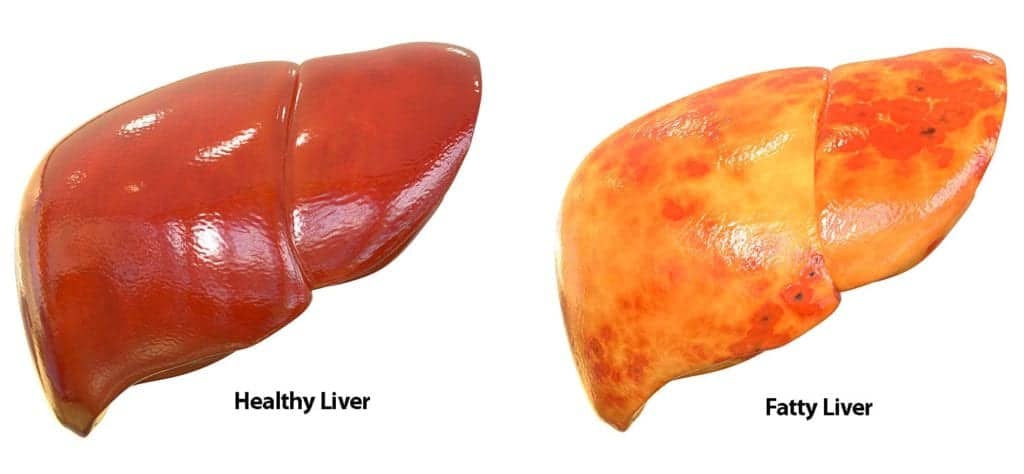Non-alcoholic fatty liver disease (NAFLD) is a common condition characterized by the accumulation of fat in the liver, leading to inflammation and potential liver damage. Adopting a ketogenic diet has gained attention as a potential therapeutic approach for improving liver health and reversing fatty liver. In this article, we will explore the process of transitioning from a fatty liver to a healthy liver through ketosis and discuss the timeframe involved.
Understanding Ketosis and its Impact on the Liver:
The ketogenic diet is a low-carbohydrate, high-fat diet that prompts the body to enter a state of ketosis. During ketosis, the liver produces ketone bodies as an alternative fuel source in the absence of sufficient carbohydrates. This metabolic shift promotes the utilization of stored fat, including fat in the liver, for energy.
>>> Check this resource to understand the Science behind Keto & Ketosis
Transitioning from a Fatty Liver to a Healthy Liver:
The duration required to transition from a fatty liver to a normal liver in ketosis varies depending on several factors, including the severity of the fatty liver, individual metabolism, adherence to the ketogenic diet, and overall health status. While there is no one-size-fits-all answer, it is possible to provide some general insights into the timeline.
- Short-term Effects:
In the initial weeks of adopting a ketogenic diet, significant reductions in liver fat can occur. This is primarily due to the reduction in dietary carbohydrates, which leads to decreased production and storage of fat in the liver. Many individuals experience improvements in liver function tests during this phase.
The duration of this phase can range from a few weeks to a couple of months.
>>> Check this article to see how long it takes to enter into Ketosis - Medium-term Effects:
Over the course of several months, sustained adherence to a well-formulated ketogenic diet can further contribute to the reversal of fatty liver. As the body continues to rely on fat as the primary energy source, stored fat in the liver is gradually depleted. This can lead to a decrease in liver inflammation and an improvement in liver health.
This phase can last anywhere from three to six months or longer. - Long-term Effects:
Continuing a ketogenic lifestyle for an extended period can provide long-term benefits in terms of liver health. Consistently following a well-balanced ketogenic diet, along with maintaining a healthy weight and engaging in regular physical activity, can support the gradual restoration of liver function and the normalization of liver fat levels.
This phase is an ongoing process that extends beyond the initial six months and is sustained over a more extended period.
Important Considerations:
It is essential to emphasize that every individual’s journey toward a normal liver will vary. Some individuals may experience significant improvements within a few months, while others may require a longer duration. Regular monitoring of liver function tests and consultation with a healthcare professional are crucial for evaluating progress and ensuring overall health.
Furthermore, it is important to note that the ketogenic diet should be followed under the guidance of a healthcare professional, especially for individuals with pre-existing medical conditions or those taking specific medications.
Conclusion:
Transitioning from a fatty liver to a normal liver through ketosis is a gradual process that requires a sustained commitment to a well-formulated ketogenic diet. While individual timelines may differ, short-term improvements in liver fat levels can often be observed within weeks, with further progress achieved over several months of adherence. Long-term maintenance of a ketogenic lifestyle, coupled with healthy lifestyle choices, can contribute to the restoration of liver health and the improvement of overall well-being. Consultation with a healthcare professional is always advised to ensure personalized guidance and monitoring throughout this journey.
References
- Reference: Title: “The effects of low-carbohydrate diets on liver function tests in nonalcoholic fatty liver disease: A systematic review and meta-analysis of clinical trials” Website: https://pubmed.ncbi.nlm.nih.gov/32788005/
- Reference: Title: “Ketogenic Diet Improves Nonalcoholic Fatty Liver Disease and Insulin Resistance in an Experimental Model of Metabolic Syndrome” Website: https://pubmed.ncbi.nlm.nih.gov/26756938/
- Reference: Title: “Effectiveness of a ketogenic diet in children with refractory epilepsy: A systematic review” Website: https://pubmed.ncbi.nlm.nih.gov/32706799/






